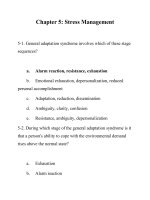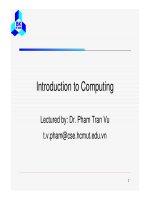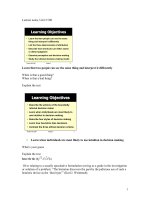Organizational behavior: Lecture 5 - Dr. Mukhtar Ahmed
Bạn đang xem bản rút gọn của tài liệu. Xem và tải ngay bản đầy đủ của tài liệu tại đây (431.55 KB, 44 trang )
Organizational
Behavior
(MGT-502)
Lecture-5
Summary
of
Lecture-4
Understanding
the Basics of
Human Behavior
Variables Influencing
Individual Behavior
The Person
• Skills & abilities
• Personality
• Perceptions
• Attitudes
•Values
• Ethics
The Environment
• Organization
• Work group
• Job
• Personal life
Behavior
B = f(P,E)
Types of work-related behaviour
Joining the
organisation
Exhibiting
organisational
citizenship
Performing
required
tasks
Types of
work-related
behaviour
Remaining
with the
organisation
Maintaining
work
attendance
Today’s Topics
Challenges to Organizations
Globalization
Diversity
Technology
Ethics
Globalization
Implications of
globalization:
–New organizational structures
–Different forms of communication
–More competition, change,
mergers, downsizing, stress
–Need more sensitivity to cultural
differences
Diversity
• Increasing Diversity in today’s
organizations
– Changing workforce demographics
– Competitive pressures
– Rapid growth in International
business
Diversity
• More women in workforce and
professions
• Diversity has advantages, but firms
need to adjust through:
–cultural awareness
–family-friendly
–empowerment
Technology
• The impact on work and jobs
• Flattening and downsizing of
organizations
• Paperless organizations
Trends: Information
Technology
• Affects how employees interact
– Virtual
teams
– Telecommuting
• Affects how organizations are configured
– Network
structures -- alliance of several
organizations
Ethics
• Moral principles/values -determines whether actions are
right/wrong and outcomes are
good/bad
Ethical behavior.
– “Good” and “right” as opposed to
“bad” or “wrong” in a particular
setting.
• Ethical dilemmas occur in
relationships with:
– Superiors.
– Subordinates.
– Customers.
– Competitors.
– Suppliers.
– Regulators.
Organizational social responsibility.
– The obligation of organizations to
behave in ethical and moral ways as
institutions of the broader society.
– Managers should commit organizations
to:
• Pursuit of high productivity.
• Corporate social responsibility.
Performance
Why Do We Care?
Ability
PERFORMANCE
Motivation
Opportunity
Performance =
f (Ability, Motivation, Opportunity)
Ability
• Mental and physical
capabilities to perform
various tasks.
Intellectual Abilities
• The capacity to do
mental activities
Intellectual Abilities
• Number aptitude
• Verbal comprehension
• Perceptual speed
• Inductive reasoning
• Deductive reasoning
• Spatial visualization
• Memory ability
Prentice Hall, 2001
Chapter 2
22
Physical Ability
• The capacity to do tasks
demanding stamina,
strength and similar
characteristics.
Basic Physical Abilities
Strength
Factors
Prentice Hall, 2001
Other
Factors
Chapter 2
Flexibility
Factors
24
Emotional Intelligence
Emotional Intelligence Involves:
•The ability to understand individuals to act
wisely in human relations
•EI abilities in five areas:
•Self-awareness
•Managing emotions
•Motivating oneself
•Empathy
•Handling relationships
25









